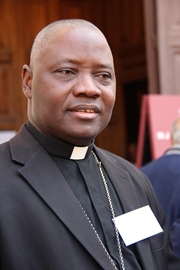|
In Nigeria, the evil of Boko Haram This is an expression of evil The Christian world is focused on Iraq, where thousands of believers are refugees in their own country, hounded if not actually brutalized by the merciless Islamist radicals of the Islamic State. Meanwhile, Africa's most populous country is under siege from Jihadist forces equally determined to impose their iron grip through a relentless killing campaign that has recently begun enlisting girls as young as 10 as suicide bombers. That is the situation in Nigeria, where a rather toothless and inept response by the government has left Church leaders among the few remaining public figures the people trust. Among them is Archbishop Ignatius Kaigama of Jos, the 56 year-old president of the Nigerian bishops' conference, one of the country's most visible and courageous Catholic prelates. With the city of Jos the site of two bomb attacks by Boko Haram on a single day last May—leaving more than a 100 dead—the archbishop is clearly in harm's way. Yet, he firmly refuses to make his pastoral visits surrounded by armed guards. "I don't have a security detail," he tells international charity Aid to the Church in Need on a recent visit to New York; "that would be a magnet for evildoers." Plus, the archbishop adds, "protecting myself would make me a prisoner. It would make people afraid. Imagine if priests would go around with protection! We believe God is with us. We believe that we will triumph despite the machinations" of the terrorists. The archbishop considers it his task to "be present," to go out among the people, "even if violence is taking place nearby." "Our leaders," he charges, "are simply not very sensitive to the poor," while the Church, even with its "limited possibilities," does what it can to help Christians and Muslims alike, "reaching out beyond political and religious divides." Even before the advent of Boko Haram—which, he says, relies on "serious sympathizers" both inside and outside Nigeria—the archbishop has been a pioneer of what he calls the "Dialogue of Life." It is an approach to Muslim-Christian relations that, realistic about the vast theological divide between the two faiths, emphasizes the establishment of friendship and connection on the most basic level. The "Dialogue" simply recognizes that "your life affects mine and mine affects yours," as the archbishop puts it. The archbishop does not mince his words: "when you kill and destroy not only combatants but women and children, poor people, it is evil. Those who died in the Jos marketplace were orange sellers, ground nut sellers, milk sellers, looking to make a little money for the evening. This is an expression of evil." He is no stranger to fear. "It is normal to be afraid," the archbishop says, "but I have given up everything to serve God and his people. I don't have a biological family, no possessions I can call my own. If I should lose my life in the process of defending people's rights to freedom of worship and the unity of humanity, I would leave behind no liabilities. Still, one is afraid of death, which is true for everybody." |
|
|

